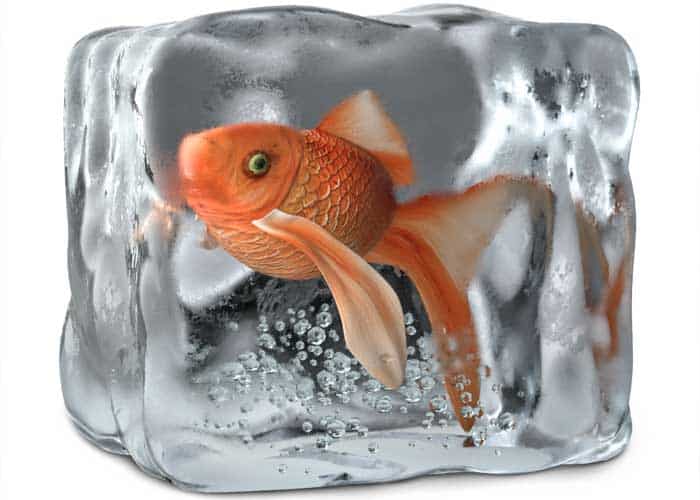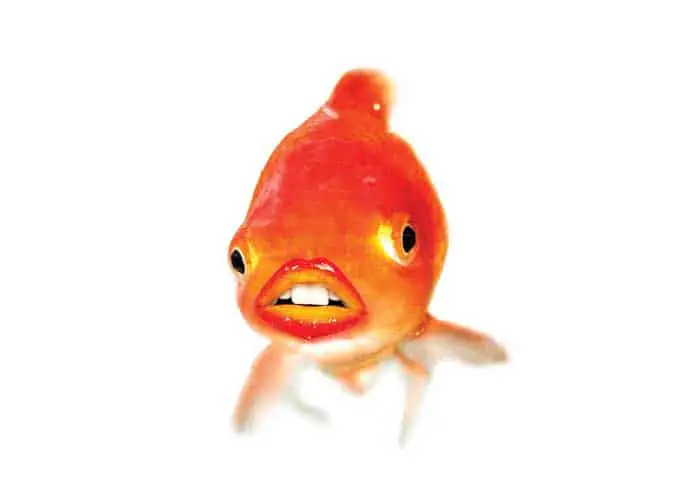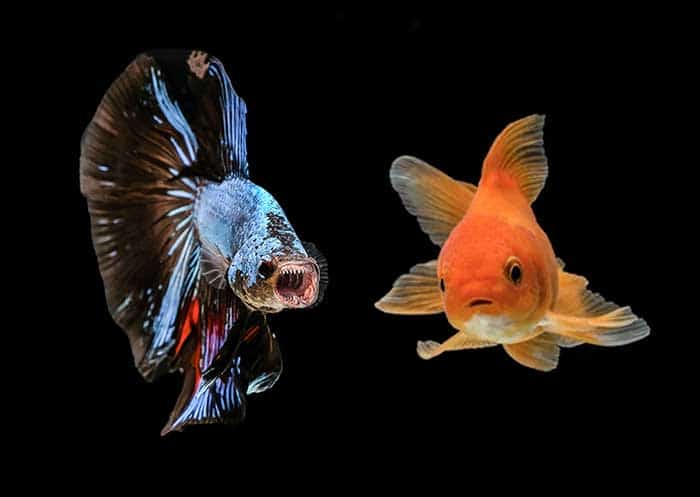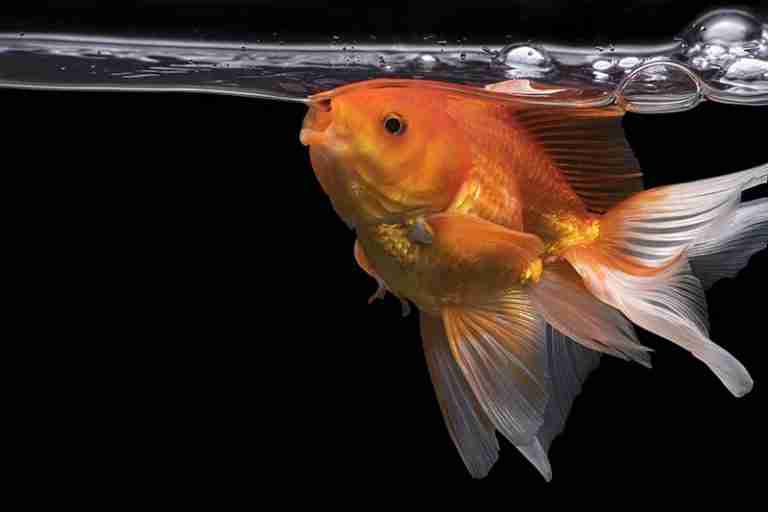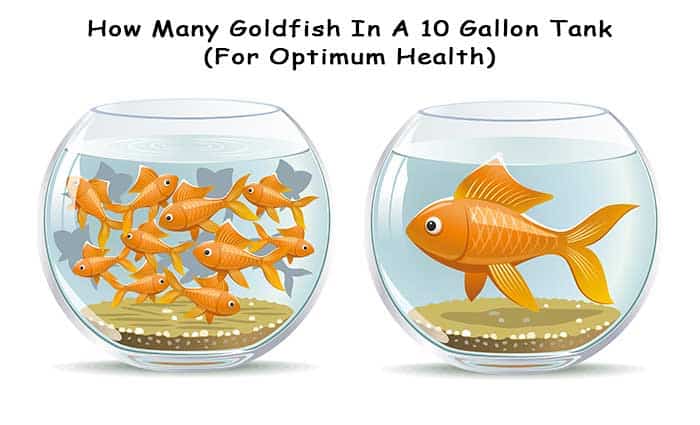How Long Do Goldfish Live (Tank, Bowl & Pond Comparison)
Goldfish are a popular pet, but how long do goldfish live? How can you make sure your goldfish lives as long as possible? How long should you expect to have your goldfish before replacing it?
On average, goldfish live for 5-10 years, but with optimal care and water conditions, the average lifespan of a goldfish can increase to between 10-15 years. The oldest known goldfish lived to the age of 43, so it could be a lifelong friend if you plan to get a pet goldfish.

Several factors impact the life expectancy of a goldfish, such as living conditions and the particular breed of goldfish. Healthy goldfish live longer on average than unhealthy goldfish.
The table below lists some of the most common goldfish varieties and their expected lifespan.
| Goldfish Variety | Average Lifespan In A Tank | Average Lifespan In A Pond |
|---|---|---|
| Common Goldfish | 10-20 Years | 15-30 Years |
| Oranda Goldfish | 8-12 Years | 8-15 Years |
| Fantail Goldfish | 10-15 Years | 10-15 Years |
| Comet Goldfish | 10-12 Years | 10-15 Years |
| Bubble Eye | NA | 3-6 Years |
The age ranges above are vastly different at the low and high end, caused by either poor or perfect living conditions. When in average water and living conditions, most healthy goldfish will live somewhere in the middle of these age ranges.
The rest of this article will cover a goldfish’s lifespan in different environments and why living in aquariums, bowls, and ponds impacts a goldfish’s age.
I also cover the average lifespan of some specific goldfish varieties, and finally, I provide some easy tips to increase the lifespan of your goldfish.
How Long Do Goldfish Live In A Tank
The average lifespan of goldfish in a tank is between 10 and 20 years. This is quite a vast age range, but many factors determine how long goldfish will live in an aquarium environment.
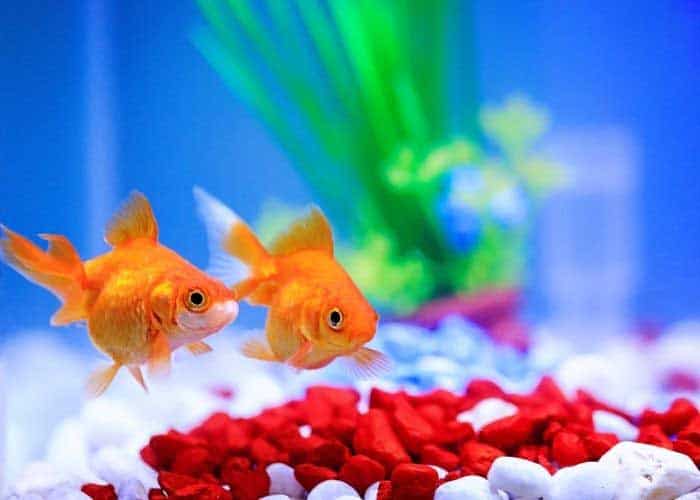
Although some goldfish are considered aquarium fish and are perfectly capable of living beyond 20 years in a tank (sometimes as long as 40 years +), it is unlikely, as fish tanks are prone to issues with water quality and disease.
Tank filtration will need to be good to stop waste build-up from becoming toxic to your goldfish. You need to keep a close eye on disease-causing bacteria that can spread quickly in such small environments, easily wiping out an entire fish tank of its occupants.
Aquariums are also confined, so unless your fish tank is very spacious, your goldfish will have limited room, reducing the exercise they can get.
Another reason why goldfish often have a shorter lifespan in a tank is the water temperature. Fish tanks are usually warmer than in the wild or in a pond, which will cause a quicker metabolism, quicker aging, and a shorter lifespan.
If you have any questions about the best fish tank size for goldfish, I recommend that you read this article: How Many Goldfish In A 10 Gallon Tank.
How Long Do Goldfish Live In A Bowl
On Average, goldfish will only live for 5-6 years in a bowl, sometimes as little as 2-3 years. Although goldfish are always portrayed as happy in goldfish bowls, they are far too confined, often leading to stress and poor health.
Fishbowls have so little water that they are challenging to keep clean and healthy, and the temperature can also change rapidly, causing temperature shock, which you can read more about here: Water Temperature For Goldfish (Aquarium and Ponds)
Goldfish also produce a lot of waste which causes fishbowl water to become toxic very quickly if not changed frequently.
A single goldfish needs a minimum of 20 gallons if you want to improve its lifespan beyond 5 years.
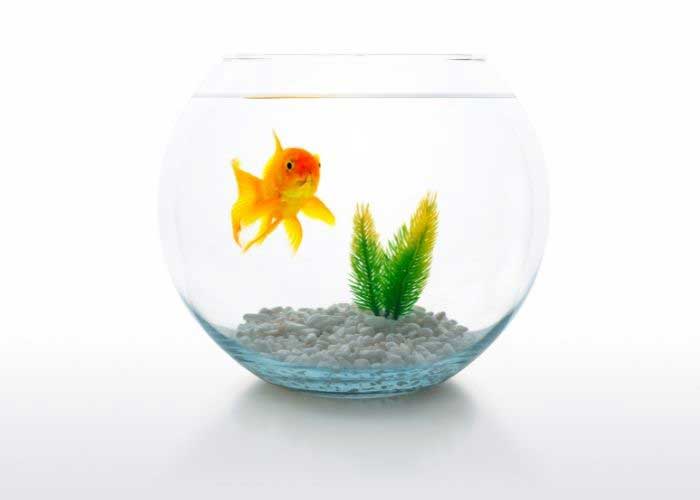
How Long Do Goldfish Live In A Pond
Most goldfish suitable for ponds will live for 12-20 years and, at the top end, can live to over 40 years with the right conditions and care. Outdoor ponds simulate the natural habitat of goldfish very well, with seasonal variations and natural light, all increasing goldfish lifespans.
Goldfish are coldwater fish, and many goldfish species can live in freezing temperatures. Goldfish can go into a state of semi-hibernation when temperatures are very low, and this causes the metabolism to slow.
As this state of semi-hibernation sets in, all biological functions, such as breathing, blood flow, and cell death, slows down, putting goldfish in a state closely resembling suspended animation. Goldfish survive freezing temperatures during this semi-hibernation, and their aging slows down, prolonging their life.
Pond water is generally colder than an indoor aquarium, also reducing a goldfish’s metabolic rate and increasing its lifespan beyond most indoor fish.
Ponds are generally larger than most fish tanks, reducing the spread of disease and infections. The waste build-up is slower and less toxic, and your goldfish have more room for exercise.
All of the above factors help to improve a goldfish’s lifespan in a pond.
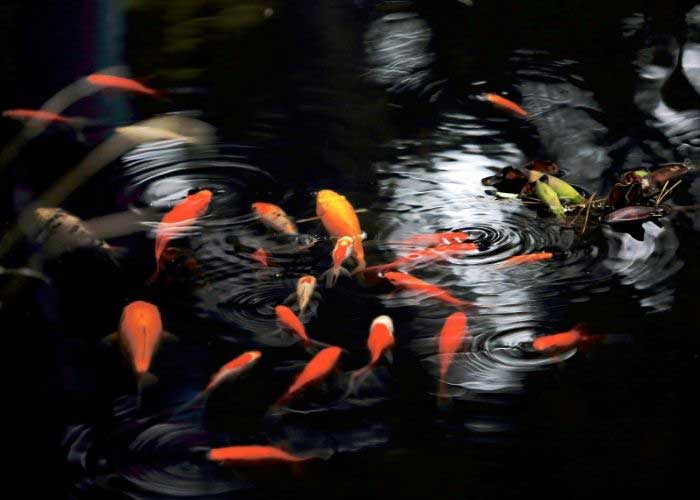
Some goldfish will not cope well in a pond, such as the delicate fancy goldfish, of which there are many varieties, such as Fantails, Bugeyed, Oranda, and Comet. These species have been selectively bred to produce differently shaped bodies, fins, and colors.
Selective breeding usually causes genetic abnormalities causing them to be more susceptible to poor water conditions, temperature changes, and diseases. Fancy goldfish are genetically further from the more “hardy” common goldfish, a slim-bodied goldfish with a smaller tail.
Common goldfish are the most robust and can survive the cold outdoor environment much better, whereas fancy goldfish are better suited to a fish tank. Fancy goldfish can live in a pond, but you need good filtration and maybe the addition of a pond heater.
How Long Do Goldfish Live In A Bag
Goldfish are usually brought home from the pet store in a bag, and you should transfer them to a tank as soon as you can. Goldfish only survive a short time in a bag, around 6-12 hours, and even this depends on the water temperature and oxygen levels within the bag. Warm water holds less dissolved oxygen, suffocating your fish.
To avoid your fish suffering from temperature shock, you need to keep the bag temperature constant. When transferring your goldfish into a tank, place the closed bag in the fish tank to allow the water temperature to change slowly to match that of the tank water. This is called acclimatization and is essential as sudden temperature changes shock your goldfish, potentially causing illness and, in some cases, death.
What Is The Maximum Lifespan Of A Goldfish
The maximum lifespan of goldfish is probably closer to 50 years. I say this as there have been plenty of reports of goldfish reaching their early to mid-40s, which I will discuss below.
If goldfish have been reported as living this long, there will undoubtedly be goldfish living longer.
Oldest Goldfish
The oldest goldfish recorded was 43 years old. This record was verified to be registered as an official Guinness world record. She was won at a funfair in the UK and named “Tish.”
Some other goldfish have been reported as living longer, but these claims remain unverified, although this record demonstrates how long goldfish can live in the right conditions.
How Old Is My Goldfish
There is no easy way to tell how old a goldfish is, especially when they can live so long. Older fish may lose some of their colors, but how old is an older fish? It could be 10 years old or 15 years old, so this isn’t much help.
Fish that have been exposed to seasonal changes outside develop rings, especially in the cold winters, that can be seen under a microscope. The rings form on the scales and can be counted to get a rough idea of age, similar to counting rings on a tree.
Again, this method is not very helpful unless your goldfish would be happy going under a microscope.
How To Make Goldfish Live Longer
Providing good care, including clean water and a healthy diet, is among the best ways to make goldfish live longer. Most fish will live longer when they receive the proper care to keep them healthy.
Below are some examples of how to make goldfish live longer.
1. Clean Healthy Water Conditions
Keeping your tank water clean and healthy is one of the best things to ensure your goldfish live a long and healthy life.
Clean water will help prevent the spread of disease and infection and reduce the build-up of toxins that can be harmful to your fish.
To avoid dirty tank water, you need to perform regular water changes using a good-quality aquarium vacuum. A water change of around 25% once a week is usually sufficient, but you may need to do this more often if your tank is heavily stocked or if you have a lot of waste-producing fish.
Waste buildup is a common cause of ammonia poisoning and ammonia burns, which are dangerous to fish. Regular water changes and gravel cycling should keep ammonia levels down, and avoid overfeeding your fish.
Keeping your tank oxygenated is important, so you may find this article beneficial to you: Do Goldfish Need An Air Pump To Help Them Breathe.
2. Provide A Good Diet
A good diet is essential for the health of your goldfish and should include a variety of live, frozen, and dry foods.
- Live foods such as brine shrimp and daphnia are a great source of nutrition for your fish and help keep their immune system healthy.
- Frozen foods such as bloodworms and mosquito larvae are another good option and are usually very easy to find at your local pet store.
- Dry foods such as flakes and pellets should make up the majority of your goldfish’s diet. There are now many high-quality options available specifically designed for goldfish.
3. Avoid Overcrowding
Overcrowding is a common problem in goldfish tanks and can lead to several issues, such as poor water quality, increased aggression, and stress.
Stress is a significant factor in developing disease and infection and should be avoided if possible.
To avoid overcrowding, you should only keep one goldfish in a tank no smaller than 20 gallons and add one other goldfish per 10 gallons. If you have a community tank with other fish species, you will also need to consider their space requirements.
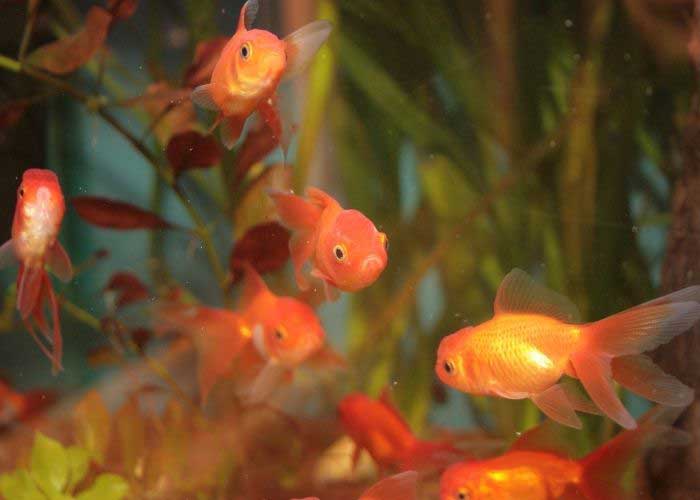
Provide plenty of live plants to help keep fish apart if they need some space, and avoid adding fish that can be aggressive.
4. Avoid Sudden Temperature Changes
Sudden temperature changes can be very harmful to your goldfish and should be avoided.
To acclimate your pet goldfish to a new tank, float the sealed bag containing your fish in the tank for around 30 minutes. This allows the water temperatures to equalize before releasing your fish. When performing water changes, ensure the new water is similar in temperature to the existing tank water.
5. Reduce Water Temperature
Goldfish generally tolerate cold water well and are more concerned about water temperature remaining constant. Colder water slows the bodily functions of your goldfish and, in doing so, also slows the aging process significantly.
Goldfish that tolerate the colder water of an outdoor freshwater pond will generally live longer in the colder water.
Wrap Up
You can see from this article that there are many factors affecting the lifespan of goldfish, such as their species, environment, and diet. Proper care for your goldfish will help ensure they live a long and healthy life.
While there is no definitive answer to the question, “How long do goldfish live?” With proper care, your goldfish should live for several years.
If you like quirky goldfish facts, check out this article: Do Goldfish Have Teeth (All your questions answered)


